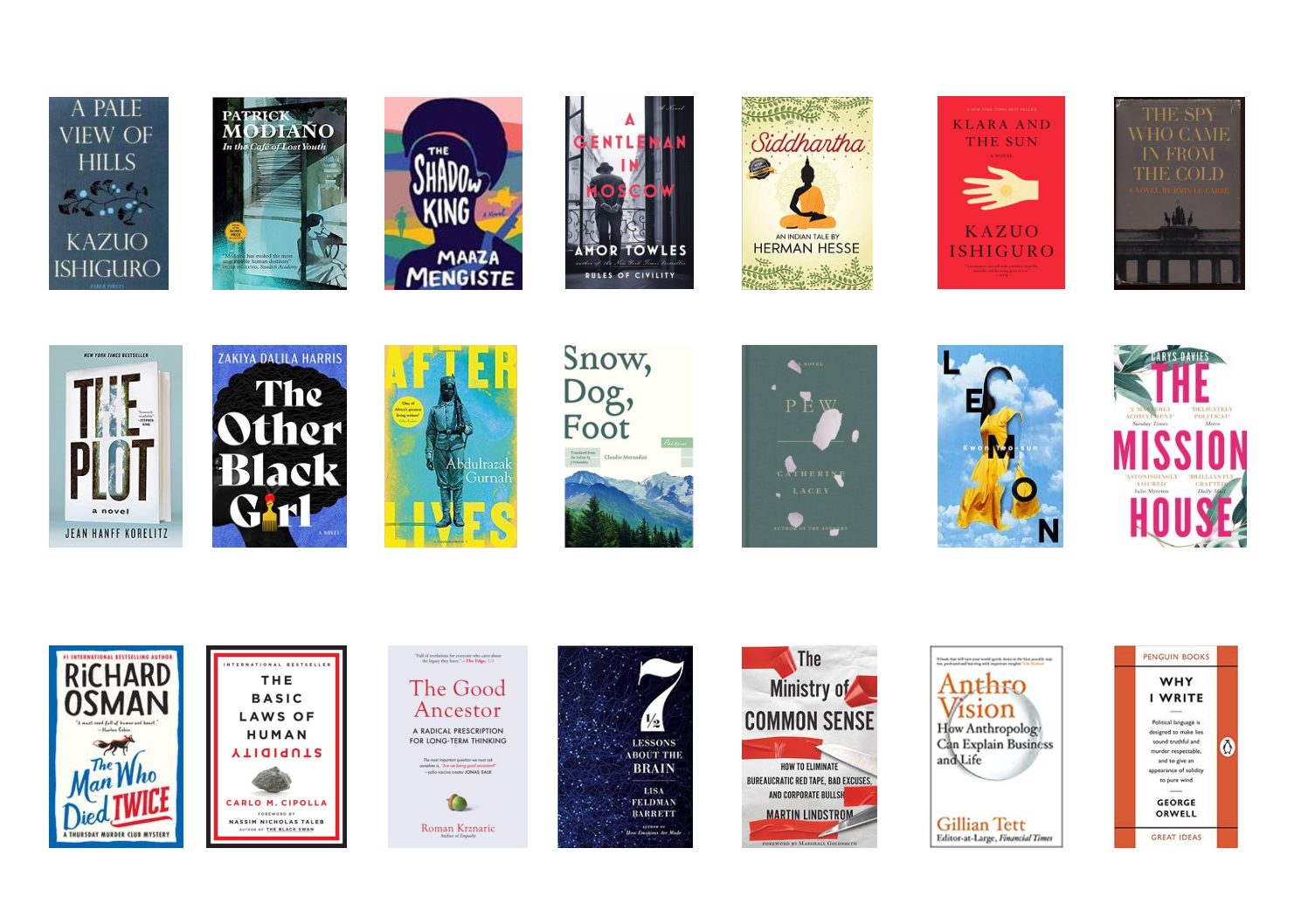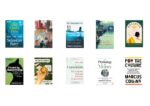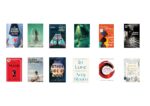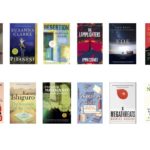My Top Books of 2021

I read 95 books in 2021. I didn’t quite make it to the heights of 2020, but that’s OK. Still way more than my annual target of 50.
Here are the best books I encountered, new and old.
The usual caveat applies: which books we love is very much a personal matter. This is not a list of books I recommend that you read; these are just my personal favourites from the past twelve months.
*************************************
I went heavy on FICTION this year, and read some truly wonderful works. I enjoyed the following titles most of all in 2021:
A Pale View of Hills By Kazuo Ishiguro
The first-ever book by the Nobel laureate. I revisited it, and was mesmerised all over again. A Japanese woman, now living in the UK, reminisces about the postwar years and why she left her country of birth. But what is she not saying? Contains one of the most surprising reveals ever, when a sudden change of pronoun reveals the real story! This book showed me (again) how sophisticated and subtle a plot twist can be when in the hands of a master.
In the Café of Lost Youth By Patrick Modiano
Every Modiano is the same. Set in Paris, moodily atmospheric, mysterious, allusive. If you like your stories to be oblique and indirect, try this French virtuoso, who creates mystery and foreboding with remarkable economy.
The Shadow King by Maaza Mengiste
This accomplished work taught me so much about a neighbouring country. It recounts how rag-tag rebels resisted Italy’s invasion of Ethiopia and the role played by the Abyssinian women in the struggle. Harrowing and rewarding, it is also the story of Haile Selassie, the emperor who was deposed twice, and his shadow. A huge new talent is announced.
A Gentleman in Moscow by Amor Towles
Master your circumstances, or be mastered by them. This highly entertaining, life-affirming work is what literature should be. Count Rostov is condemned by the Bolsheviks to spend the rest of his days in a Moscow hotel. How his life then unfolds is a work of remarkable genius. The aristocrat manages to lead a life of rich and rewarding relationships without ever leaving.
Siddhartha by Herman Hesse
Another true classic, revisited. One man’s search for meaning in ancient India is documented here. He tries asceticism and simplicity, only to reject it. He explores big business and materiality, only to be disgusted by the “child-people” he encounters there. Carnality and bodily pleasure similarly take him nowhere. Finally he ends up next to a river, a tired, disillusioned figure. Does he find the meaning he seeks? I’ll leave you to find out.
Klara and the Sun by Kazuo Ishiguro
Another Kazuo this year—because he had a rare new book out in 2021. I bought and read it immediately. Such is this author’s genius that he has written an entire novel in the voice of a robot, an Artificial Friend from the near future. I learned more about where AI, automation and gene splicing might take us than from a posse of tech books, and yet this is a gripping story, full of humanity and nuance. Sheer class.
The Spy Who Came in From the Cold by John Le Carré
The accomplished spy writer passed away this year, and in his memory I went back to his breakout book from decades back, the one that introduced a whole genre—the unglamorous, gritty reality of spycraft. This book is masterly in creating a world of shadows where no one can be trusted. Betrayals come thick and fast. A complex work that is about humans trapped in systems no one controls.
The Plot by Jean Hanff Korelitz
A failing writer steals a book plot from a dead one—and lives to regret it when spooky messages start arriving. A sophisticated page-turner, this, with deeper messages about appropriation and plagiarism.
The Other Black Girl by Zakiya Dalila Harris
A debut novel with real bite. It’s about race and politics in the office—but it’s also about hair! Funny and edgy, squirmy and scary. A fresh new voice has arrived, to much applause.
Afterlives by Abdulrazak Gurnah
One of my faves got the Nobel this year—and interest in his latest book spiked. Set in German East Africa in the first half of the 20th century, it tracks the sweep and horror of colonialism by immersing us in the lives of ordinary people who have their lives upturned by world affairs. Gurnah has such rich understanding of the details and dailyness of his culture, and always creates a gripping narrative. An amply deserved recognition.
Snow, Dog, Foot by Claudio Morandini
This must be one of the oddest books ever, translated from Italian. An old recluse lives a life of extreme detachment up in the mountains. He seems to forget things. A friendly ranger tries to keep an eye on him. A talking dog arrives, and becomes the old man’s companion (!). When the temperature rises, man and dog discover a human foot sticking out of the melting snow…I’ll say no more! A short and unforgettable journey into the depths of solitude and madness.
Pew by Catherine Lacey
More weirdness. A young wanderer is found sleeping in a church pew and adopted by the community. But this person is of indeterminate race or gender. What do humans do with folks they can’t place in boxes? A really original work about identity and inclusion, community and suspicion.
Lemon by Kwon Yeo-sun
Yep, it was my year of really short, really unusual reads. This is a murder mystery. But it’s also a commentary on class and privilege in Korea. It’s a whodunnit—but it’s also about the consequences of violent death, felt decades later. A beautiful young girl was killed. You can piece together who did it (if you look carefully) but this author plays with form and structure in such interesting ways that she leaves us both satisfied and wondering about our conclusions…
The Mission House by Carys Davies
This remarkable new writer’s second novel transports us to contemporary India. A friendly but very nervous English librarian arrives in a cool hill station and takes up temporary residence in a mission house next to a presbytery. His relationships with his auto-rickshaw driver, a friendly padre and his adopted niece engross us. Is it just a travel tale, or an allegory on colonialism and its relics? The dark shadow of an increasingly sectarian and intolerant country is always just behind the story. A masterpiece.
The Man Who Died Twice by Richard Osman
Finally, a book that’s just whiz-bang fun! This new author continues the series set in an old-folks community in England which has topped the best-seller lists since last year. Our four elderly sleuths are great fun to be with, villains abound, there are twists and turns aplenty. The plot is complex. Believable? Of course not! This is great escapist entertainment, told with wit and verve. Enjoy.
*************************************
My NON-FICTION shelf was not as richly populated this year, but had some standout contenders nonetheless.
The Basic Laws of Human Stupidity by Carlo M. Cipolla
A late professor’s study of a group of people who dominate the world, despite having no leader or structures or shared purpose—the stupid! These people cause huge losses to others while gaining nothing themselves. The author tells us that that there are are many more such people than we think; and that their frequency is independent of education! Is this satire, or a serious treatise? You decide.
The Good Ancestor by Roman Krznaric
This one really resonated. A powerful, thoughtful study of how to live for the long term, and to be the ancestors our descendants need us to be. The author takes us on an odyssey of what living for those not yet born—our highest purpose as humans—might look like. Profoundly thought-provoking. Everyone should read it.
7 1/2 Lessons About the Brain by Lisa Feldman Barrett
A mind-blower. A top researcher reveals that we don’t use our brains to learn and think—just to regulate our bodies and spark responses. Our brains construct their own realities, so there is nothing objective going on. The mind boggles! A very necessary read, if we want to make more of our minds.
The Ministry of Common Sense by Martin Lindstrom
A business book with bite and humour, this one—it made me both laugh and clap at various points. Why do large organizations do things so pointedly stupid and self-defeating? Why do bureaucracies grow their rule books to the point of utter absurdity? And why can no leader step up and stop the nonsense? A bracing and riotous ride.
Anthrovision by Gillian Tett
I increasingly look for business lessons from non-business people—psychologists, biologists, and now, anthropologists. Gillian Tett, with a doctorate in anthropology and decades as a senior FT business editor, is uniquely equipped to straddle these two worlds. She makes some very sharp observations about the hidden role of culture and group behaviour in the business world.
Why I Write by George Orwell
I end the year with this set of essays by the author of Animal Farm and 1984. Why do writers write? For the world, for posterity—or for their own egos and status? The title essay alone was worth the price of entry, but the author also makes hilarious observations about the nature of the English—being played out daily in the buffoonery of the current leadership, decades later.
*************************************
That’s it. For more detailed reviews of some of the above, please visit my Instagram page (@sunnysunwords). Happy reading!

Buy Sunny Bindra's new book
The X in CX
here »
Popular Posts
- The pause that saves usJune 8, 2025
- Where are you rushing to—your funeral?June 29, 2025
- How to spot a real thinkerJune 15, 2025
- Built the app, forgot the flowJune 22, 2025
- The first push is the hardestJune 1, 2025















